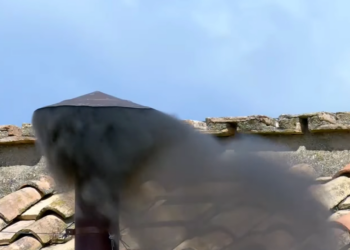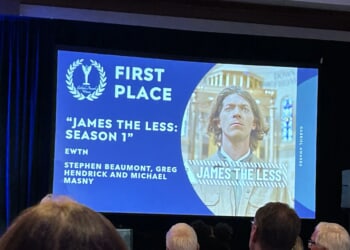Dr Tim Aker is the Academic Director of the Margaret Thatcher Centre and editor of ‘The First Brexiteer: The Diaries of Sir Neil Marten’. He writes at A Place in History on substack.
Almost exactly fifty years ago Neil Marten led the ‘No’ campaign into a bitter defeat in the 1975 EEC referendum. By two to one the country voted to stay in the European Community.
So who was he and why was this relatively unknown character chosen to chair the ‘No’ campaign rather than a big hitter like Tony Benn or Enoch Powell?
Neil Marten was born in 1916, privately educated at Rossall, trained as a solicitor and joined the army at the outbreak of the war. In 1941 he was recruited to the Special Operations Executive and parachuted into France to train the resistance. After the war he joined MI6 and served in Malaya, Egypt, Turkey, Germany and Cyprus.
At MI6 HQ in London he organised operations to smuggle people out from behind the Iron Curtain. The rest is wrapped in mystery; the government, understandably, will not release Marten’s file to his family. He was elected to parliament in 1959 representing Banbury in Oxfordshire and was appointed parliamentary secretary to the Aviation Ministry in 1962. After the 1964 election defeat, he returned to the backbenches where he made his name.
Marten’s political motivation was parliamentary sovereignty. Although he voted for entry to the EEC in 1961 (Anthony Fell was the only Conservative to vote against), he regretted it and voted against in 1967. It was with some interest that Marten heard Edward Heath’s speech to the Chambers of Commerce in Paris in May 1970. The Conservative leader called for the ‘full hearted consent’ of parliaments and peoples as a requisite for entry. Marten would never let Heath forget those words and in August called for a referendum.
After the 1970 election Heath offered Marten office, but he refused citing their disagreement on Europe.
He noted in his diary that Heath had made a mistake; it was better to have him inside the tent. How right he was.
The battle on entry was fractious and nearly brought down the administration. Marten was the right man to lead the rebels. Enoch Powell was a loner, marginalised not just by his Birmingham speech but also a covert campaign to undermine Heath at the election. Derek Walker-Smith, Marten noted, was seldom in parliament and busy with his duties at the bar despite being a senior anti-marketeer.
Marten’s strengths were his organisational abilities.
Recalling that the Conservatives were the pro-European party, Marten’s efforts nurtured grassroots ‘anti-market’ feeling, preventing them being railroaded by the party machine. This was vital to keep the Eurosceptic lights on in the party.
After a spat with the party chairman, who only permitted Conservative literature that was pro-EEC, Marten organised the ‘Conservative Anti-Common Market Information Service’ under the chairmanship of Faversham MP, Roger Moate. It built a membership base in the constituencies, commissioned opinion polls, and supplied colleagues with briefing papers. Such was its strength it held an alternative rally at the 1971 party conference. Marten became the whip for anti-market MPs as the vote on the principle of joining the EEC approached in October 1971.
That summer Conservative Associations began campaigns of intimidation against their MPs with talk of deselecting rebellious anti-marketeers. Marten’s case was almost comical. His Association tried to censor his remarks at the opening of a local fete. Rather than be gagged, Marten withdrew and the furore ended up in the national press.
They subsequently passed a veiled motion of censure, that Marten had only 24-hours’ notice of. He wrote of a wealthy ‘hunting set’ that continuously put pressure on him, conscious that the reorganisation of constituency boundaries made open contests for new seats more likely. Indeed, the anti-EEC MP Ronald Bell in South Buckinghamshire faced a year-long struggle to retain his candidacy.
What killed the rebellion in Banbury stone dead was Marten’s threat to force a by-election. His colleague David Mudd in Camborne had had similar trouble with his Association and a letter to Marten informed him that the simple threat of a by-election had silenced his critics. Other rebels used the same threat to get their Associations to back down.
The vote on 28 October 1971 was not, contrary to perceived wisdom, the defining moment of British accession to the EEC. The Second Reading of the enabling Bill on 17 February 1972 was the test of strength.
Heath made it a vote of confidence, hoping that fear of a Labour election victory would force the rebels into line. Far from it. Marten kept a group of fourteen other Conservative and Unionist MPs together and voted against the de facto confidence motion. By the slimmest majority of eight, down from 112 in October, the government won the day, saved by Liberal votes. Was it full-hearted consent?
Marten recorded in his diary how grim the experience was – and not just for the Conservatives.
In the ‘no’ lobby he saw a Labour MP in tears, some covering their faces as they obeyed the whip against their own instincts. In remarkable scenes afterwards Labour MPs tried to drag Jeremy Thorpe over to the government benches, realising the Liberals had saved Heath’s bacon. Even Roy Jenkins voted against the Second Reading. Anti-market Tories were outraged, Robin Turton threatened to call a by-election at Thirsk on the provision that Labour didn’t stand. Labour refused Turton’s offer, saving the Conservatives from a very early, very serious split on Europe.
It was, however, Jenkins decision to resign as Labour deputy leader in April 1972 that brought the beginning of the end. Ironically it was in response to Marten’s amendment calling for a referendum, one Tony Benn had cajoled his party into supporting. From then on Labour pro-marketeers managed abstentions to secure passage of the Bill.
It was in recognition of that struggle Marten was asked by fellow anti-marketeers to chair the ‘No’ campaign in the 1975 referendum, one he had called for in 1970 and 1972. He recognised it was an impossible job.
Outspent and outgunned, it was also a divided campaign as relations between the combined anti-market organisations deteriorated. Nonetheless he received his leadership of the campaign was well recognised, Harold Wilson amongst those paying tribute to him.
Marten’s resilience meant he would not give up the cause after defeat.
He was pragmatic enough to realise that with a decisive result he now had to turn to his colleagues and convince them what they had signed up to was far worse than they realised.
He started long-running campaigns against EEC-mandated heavy lorries, live export of animals for slaughter, and a directly elected European parliament. At every opportunity he tried to get parliament to mandate ministers before they negotiated at the European Council. He supported and then privately briefed Margaret Thatcher on EEC matters, recording that she was with them in principle but was boxed in by her advisors and the shadow cabinet.
This is but a snapshot of an over-looked political career. On this day, however, it is right to pay tribute to Neil Marten who stepped forward and took on an impossible task. Against all the pressures thrown at him, he did the job for parliamentary sovereignty and for his country.


![Tulsi Gabbard Calls for Arrest of James Comey Over Call to Assassinate Trump [WATCH]](https://www.right2024.com/wp-content/uploads/2025/05/Tulsi-Gabbard-Calls-for-Arrest-of-James-Comey-Over-Call-350x250.jpg)


![Declaration Gaffe, Whisper Creep, and Conflicting Cancer Claims [WATCH]](https://www.right2024.com/wp-content/uploads/2025/05/Declaration-Gaffe-Whisper-Creep-and-Conflicting-Cancer-Claims-WATCH-350x250.jpg)

![Trump Drops Bombshell Video Linking Clintons to Mysterious Deaths [WATCH]](https://www.right2024.com/wp-content/uploads/2025/05/Trump-Drops-Bombshell-Video-Linking-Clintons-to-Mysterious-Deaths-WATCH-350x250.jpg)


![Bessent Exposes Media Lies About April’s Stock Market Performance [WATCH]](https://www.right2024.com/wp-content/uploads/2025/04/Bessent-Exposes-Media-Lies-About-Aprils-Stock-Market-Performance-WATCH-350x250.jpg)






